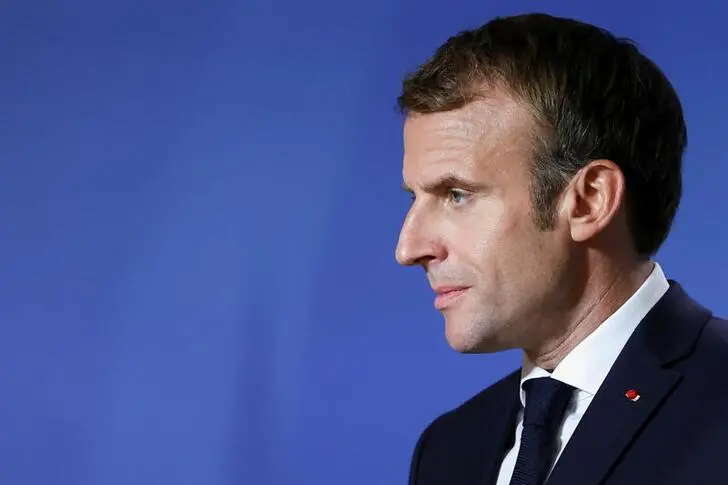PHOTO
In the first months of his presidency in 2017, French leader Emmanuel Macron hosted bitter Libyan rivals Fayez Al-Sarraj, then-prime minister of the Tripoli-based government, and Khalifa Haftar, the military commander who controls the east of the country.
The meeting proved an early foreign policy success for the French president after the two opponents agreed to a ceasefire and the organization of elections. Similar French initiatives and efforts failed to yield the same results in Lebanon, where the national leaders agreed to keep the country in despair.
As the French president’s first term enters its final months ahead of next year’s presidential election, much has changed, yet the fundamentals in Libya remain the same.
In Lebanon as in Libya, Macron is clearly accepting France’s responsibility. In Lebanon, it is an emotional one, while in Libya it is the fallout from the NATO-led military intervention in 2011. One might disagree on many points of his presidency, but nevertheless there is a courageous desire to be honest and transparent when it comes to these files.
The French president has always indicated that, when it comes to Libya, it is an “inheritance war” and that he was opposed to the military intervention. He has nevertheless accepted France’s responsibility and abided by the “you break it, you own it” rule. And so, last week, France hosted an international conference on Libya with more than 30 leaders and diplomats. The declared objective was to support and encourage peaceful and transparent presidential elections planned for Dec. 24, followed by a legislative vote. Will Macron have the time before the end of this first mandate to pick up on his early wins in 2017 and bring stability to the war-torn country?
Despite all the efforts and bandwidth deployed by the French foreign policy on Lebanon, which for a time seemed like the sole focus of the French president, it now seems clear that a resolution or positive outcome is highly unlikely. As a result, Libya is more worthy of the president’s attention in the coming months, especially if greater alignment between European and regional actors allows for a deepening of stability.
Moreover, Libya is strategically more important than Lebanon for France and, indeed, Europe, not only in order to control the migrant influx from Africa, but also for its energetic diversification and as a key to the geopolitical stability of the entire Mediterranean region. A win in Libya would be a much bigger achievement for Macron’s foreign policy vision.
The conference, which focused on the elections, as well as a gradual departure of foreign fighters, ended in a cautious success. Candidates from various sides of the political spectrum are moving forward with the submission of their candidacy papers. Questions remain about the candidacy of Abdelhamid Dbeibah, the interim prime minister, who has become a powerful figure for the West and who previously pledged not to participate.
Dbeibah’s post-conference declarations indicated a wish to participate, as he called on the “people to decide for him” and heavily criticized current election laws that forbid him from taking part. His participation will require either an amendment to the law or a postponement of the poll until three months after he relinquishes his current public duties. Despite the importance of the legislative elections, any obstruction to his participation could lead to the results being rejected and the country lurching back to instability.
The US, which seems to be taking a back seat in this case, has highlighted the importance of elections. Yet even more important is a broad consensus on the country’s affairs between the forces of east and west. This also requires an agreement between regional and international actors. In that sense, it seems clear that the situation in Libya was aggravated by divisions in the European camp between France and Italy.
Among the accusations was that Italy was supporting the west, while France was backing the east in order to advance their own interests. The latest conference has revealed a more neutral approach by European countries in order to let the Libyan stakeholders make their own decisions. In that sense, there is something to be learned from the operations of the Libyan central bank.
A change in regional alignments could also prove beneficial for a resolution of the Libyan conflict. With the support of France, Arab countries have taken an active approach in reducing tensions between Turkey and Russia, starting in Syria, and this could also be positive in Libya.
An encouraging step — the repatriation of 300 foreign fighters who support Haftar — was also announced at the conference by Macron. However, the French leader insisted that this was only a beginning, and that both Turkey and Russia needed to withdraw their military forces, which threaten the stability of the entire region. It is now noticeably clear for all that, when countries fall apart, chaos empowers non-state actors, with dangerous consequences for everybody.
France understands that a breakthrough in Libya will encompass a regional and global understanding. It is also clear to Macron that this could hold the key to his re-election, as well as France’s leadership in a more unified EU foreign policy strategy. A nascent overarching strategy is helping to shape the new realities of the Middle East.
- Khaled Abou Zahr is CEO of Eurabia, a media and tech company. He is also the editor of Al-Watan Al-Arabi.
Copyright: Arab News © 2021 All rights reserved. Provided by SyndiGate Media Inc. (Syndigate.info).





















